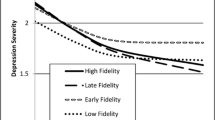Abstract
Dropout from outpatient mental health treatment may contribute to high rates of relapse and rehospitalization among veterans with chronic posttraumatic stress disorder (PTSD). In a quasi-experimental cohort study, 87 male and 17 female veterans discharging from residential PTSD treatment received either standard referral to outpatient care (N = 77) or standard referrals supplemented by biweekly telephone calls (N = 27). Telephone monitoring and support was feasible and acceptable to 85% of clients. Compared to prior patient cohorts, clients receiving telephone support were twice as likely (88% vs. 43%) to complete an outpatient visit within 1 month of discharge and reported higher satisfaction with care.


Similar content being viewed by others
References
Dietrich, A.J., Oxman, T.E., Williams, J.W. Jr., Schulberg, H.C., Bruce, M.L., Lee, P.W., Barry, S., Raue, P.J., Lefever, J.J., Heo, M., Rost, K., Kroenke, K., Gerrity, M., & Nutting, P.A. (2004) Re-engineering systems for the treatment of depression in primary care: Cluster randomised controlled trial. BMJ, 32, 602.
Fontana A., Rosenheck R., Spencer H., Gray, S. (2003). The long journey home XI. Treatment of posttraumatic stress disorder in the Department of Veterans Affairs: Fiscal year 2002 service delivery and performance. Northeast Program Evaluation Center, Department of Veterans Affairs, West Haven, CT
Hartl T. L., Rosen C. S., Lee T., Drescher K., Crawford E., Wilson K. A. (2005). Predicting high risk-behaviors in combat veterans with posttraumatic stress disorder. Journal of Nervous and Mental Disease 193:464–472
Hilton M. E., Maisto S. A., Conigliaro J., McNiel M., Kraemer K., Kelley M. E., Conigliaro R., Samet J. H., Larson M. J., Savetsky J., Winter M., Sullivan L. M., Saitz R., Weisner C., Mertens J., Parthasarathy S., Moore C., Hunkeler E., Hu T. W., Selby J., Stout R. L., Zywiak W., Rubin A., Zwick W., Shepard D. (2003). Improving alcoholism treatment across the spectrum of services. Alcoholism Clinical and Experimental Research 25:128–135
Jerant A. F., Azari R., Martinez C., Nesbitt T. S. (2003). A randomized trial of telenursing to reduce rehospitalization for heart failure: Patient-centered outcomes and nursing indicators. Home Health Care Services Quarterly 22:1–20
Keane T. M., Caddell J. M., Taylor K. I. (1988). Mississippi scale for combat-related PTSD: Three studies in reliability and validity. Journal of Consulting and Clinical Psychology 56:85–90
MacDonald J., Brown N., Ellis P. (2000). Using telephone prompts to improve initial attendance at a community mental health center. Psychiatric Services 51:812–814
McKay J. R., Lynch K. G., Shepard D. S., Ratichek S., Morrison R., Koppenhaver J., Pettinati H. M. (2004). The effectiveness of telephone-based continuing care in the clinical management of alcohol and cocaine use disorders: 12 month outcomes. Journal of Consulting and Clinical Psychology 72:967–979
McLellan A. T., Kushner H., Metzger D., Peters R., Smith I., Grissom G., Pettinati H., Argeriou M. (1992). The fifth edition of the addiction severity index. Journal of Substance Abuse Treatment 9:199–213
Piette J. D., Weinberger M., Kraemer F. B., McPhee S. J. (2001). Impact of automated calls with nurse follow-up on diabetes treatment outcomes in a Department of Veterans Affairs Health Care System: A randomized controlled trial. Diabetes Care 24:202–208
Ronis D. L., Bates E. W., Garfein A. J., Buit B. K., Falcon S. P., Liberzon I. (1996). Longitudinal patterns of care for patients with posttraumatic stress disorder. Journal of Traumatic Stress 9:763–781
Author information
Authors and Affiliations
Corresponding author
Additional information
This research was supported by a Department of Veterans Affairs (VA) HSR&D Local Initiative Grant LIP 62-090 “Feasibility of telephone case monitoring for veterans with PTSD” to the first author. Preparation of this manuscript was also supported in part by the VA National Center for Posttraumatic Stress Disorder, VA Sierra-Pacific Mental Illness Research, Education, and Clinical Center, VA Health Services Research and Development Service, and VA Palo Alto Health Care System. Opinions expressed are those of the authors and do not necessarily reflect the position of the Department of Veterans Affairs.
Rights and permissions
About this article
Cite this article
Rosen, C.S., DiLandro, C., Corwin, K.N. et al. Telephone Monitoring and Support For Veterans with Chronic Posttraumatic Stress Disorder: A Pilot Study. Community Ment Health J 42, 501–508 (2006). https://doi.org/10.1007/s10597-006-9047-6
Received:
Accepted:
Published:
Issue Date:
DOI: https://doi.org/10.1007/s10597-006-9047-6




